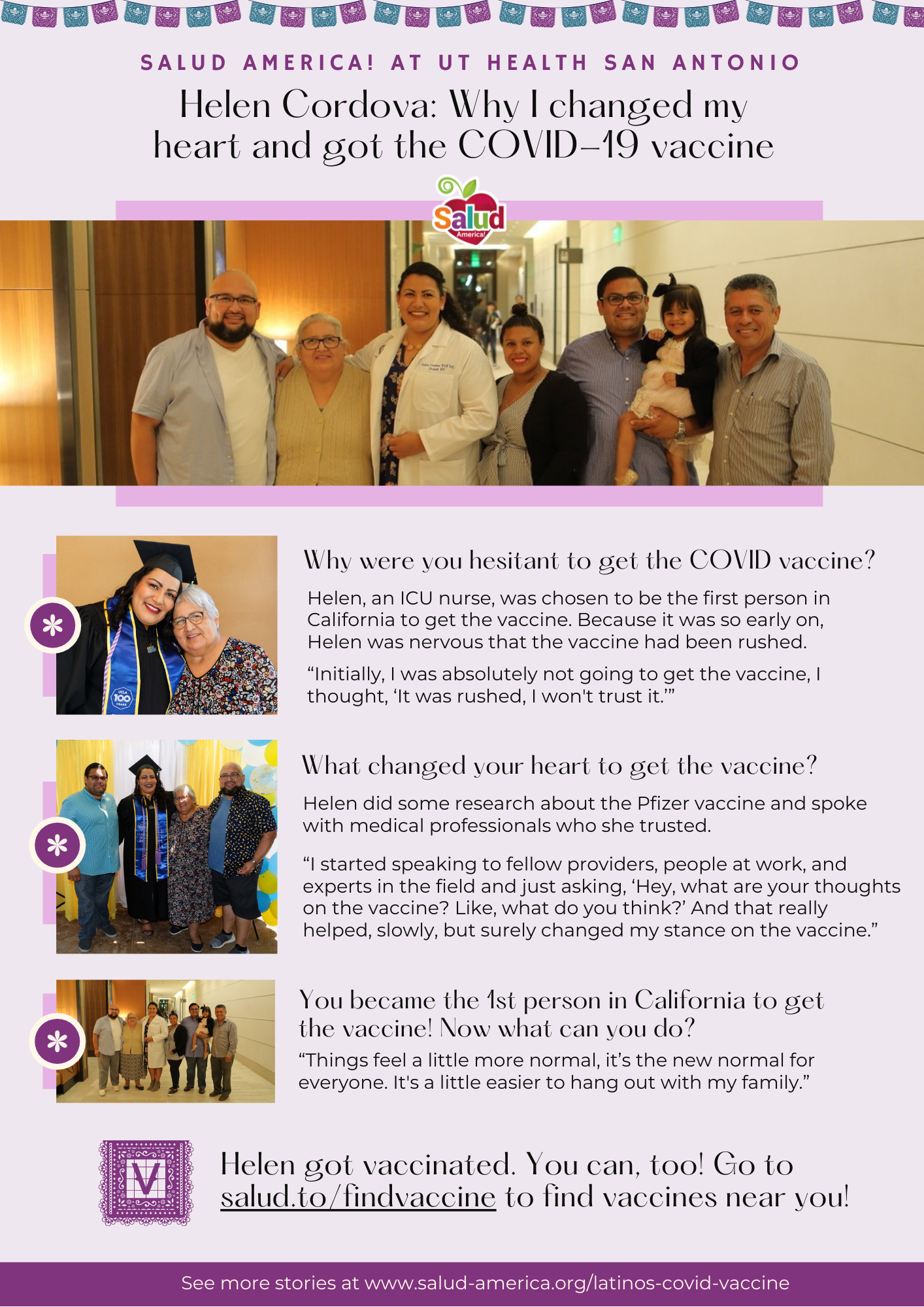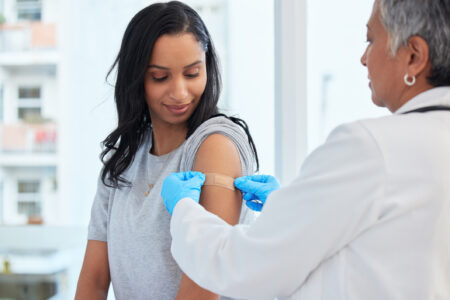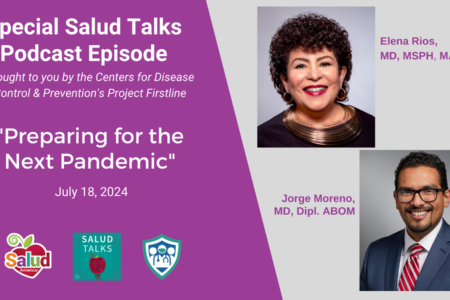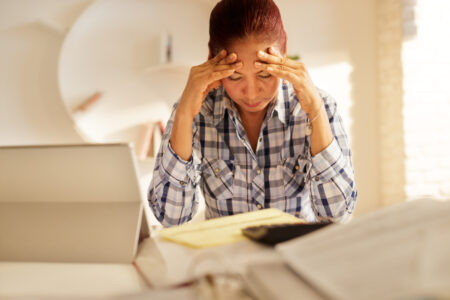Share On Social!
Helen Cordova knows how dangerous COVID-19 is.
She’s been working on the frontline as an ICU nurse throughout the entire pandemic.
“COVID was definitely a big shock for the healthcare community. There was just so much uncertainty and things we didn’t know about it,” Cordova said.
When the vaccine was first authorized for emergency use by the FDA in December 2020, Cordova was chosen to be one of the first recipients of the vaccine.
But she was very nervous and didn’t originally want to get it.
“Initially, I was absolutely not going to get the vaccine. I thought, ‘It was rushed, I won’t trust it,’” Cordova said.
But after consulting with her colleagues and reading the research from the clinical trials, Cordova knew it was safe and the right decision.
“I remember talking with my coworker the evening before the first dose, and we both were like, ‘You know, if we can do this to protect our families and be an example for our families, then why not? Why not us? And just take that leap of faith. We’ve got to trust the medical community, the scientific community, in this decision and in this process,’” Cordova said.
Find COVID-19 vaccine locations near you with salud.to/findvaccine!
COVID-19 Precautions at Home
Cordova lives with her mom in Canoga Park, a neighborhood in Los Angeles, Calif., where she works as an ICU nurse at Kaiser Permanente Los Angeles.
Cordova was one of the first to take care of COVID-19 patients in the hospital.

Los Angeles (48% Latino) has been severely impacted by COVID-19 over the last year. Cordova has seen Latinos particularly affected.
“As an ICU nurse, I’ve seen the sickest of the sick. And unfortunately, at the peak of the pandemic, it was just a huge number of Latinos in the ICU, and the pandemic has just affected them disproportionately,” Cordova said.
Cordova had to take extensive precautions to keep her family safe from the virus.
At the beginning of the pandemic, she would shower at work, come home and enter through a separate entrance from her mother, shower again, and eat at a separate table from her.
“A lot of that was carried out for a long time because we just didn’t know, out of abundance of caution for her and for the rest of my family. And that’s sort of what the routine was for a long time,” Cordova said.
Fortunately, neither Cordova nor her high-risk mother caught the virus, but some of her other family members did.
“My oldest brother and my nephew got COVID. Thankfully, it was a very minor case for both of them. But there was always again that uncertainty, will they have a severe case? Will they be going to the hospital?” Cordova said.
It was difficult for her and made the pandemic feel too close to home.
“It was during the second surge that that happened, and so that’s when it made it even more real. As if it wasn’t real enough already, it’s getting closer to home. And so that was a little bit jarring to have to deal with, still go to work and but thinking in the back of your head, is my family okay?” Cordova said.
Cordova was relieved when her family members recovered well.
But then it was time to get the vaccine.
Find COVID-19 vaccine locations near you with salud.to/findvaccine!
Initial Hesitation about the Vaccine Turns to Confidence
Initially when the vaccine was announced, Cordova was very skeptical about how quickly it was produced.
“Initially, I was absolutely not going to get the vaccine, I thought, ‘It was rushed, I won’t trust it,’” Cordova said.

She had hoped others could take it first and then maybe she would get it later.
But as she saw data from the clinical trials come forward, Cordova began thinking differently.
“I started speaking to fellow providers, people at work, and experts in the field and just asking, ‘Hey, what are your thoughts on the vaccine? Like, what do you think?’ And that really helped, slowly, but surely changed my stance on the vaccine,” Cordova said.
While she felt more confident in the vaccine, Cordova was still very nervous to get her first dose.
Because her unit was one of the first in the hospital to care for COVID-19 patients, Cordova and her colleagues were selected to receive the first doses.

She found out she was getting it only a day before getting the shot and began having second thoughts.
“When I got that call from my manager and it was set, I started having this inner turmoil, like what did I just do? Am I making the right decision?” Cordova said.
When Cordova told her mother that she was getting the vaccine, her mother was worried that the vaccine wasn’t safe, and that Cordova was putting herself in danger.
But as Cordova reread the data from the Pfizer clinical trials, she felt more confident in her decision and explained that to her mom.
“The next morning, my mom was like, ‘You know what, you’re going to be okay. And when it’s my turn to get the vaccine, I’m going to sign up and I will get the vaccine as well,’” Cordova said.
Find COVID-19 vaccine locations near you with salud.to/findvaccine!
“Honored and Humbled” to Get the Vaccine
Cordova got her first dose of the Pfizer vaccine on Dec. 14, 2020, only two days after the Pfizer vaccine was authorized for emergency use by the FDA.
She was the first recipient of the vaccine in California, and likely one of the first on the entire west coast. Dozens of media outlets covered her shot, including the LA Times, The New York Times, and Associated Press.
Cordova appreciates how the process of caring for COVID-19 patients came full circle.

“In hindsight, looking at it all, it’s amazing that I was able to experience all that and I’m very honored and humbled as to what the experience has been and brought from it. I was among the first to care for COVID patients, our unit was the first one in the hospital to care for COVID patients, and I was among those nurses. And so it kind of came full circle like, you were the first to take care of these patients, be the first to receive the vaccine and start having that protection built within you,” Cordova said.
Now that her entire family is also vaccinated and COVID-19 cases have gone significantly down in Los Angeles, Cordova can breathe a sigh of relief.
“Things feel a little more normal, it’s the new normal for everyone. It’s just a little easier to hang out with my family. For me personally, I always had that worry that I’d be the one to bring something to my family members. But now we’re all learning to navigate that new normal and taking the precautions to the extent that I was doing before has definitely diminished down now that the vaccine is out,” Cordova said.
She hopes that people who are hesitant about the vaccine will do research from credible sources and make the best decision based on medical research.
“It’s the same thing I did, do your research, go to credible sources, don’t just trust whatever comes up on the internet. Talk to your doctors, to experts in the field, anyone who’s actually decided to get the vaccine. Talk to them and do that research to really get objective data to make that decision. The governing bodies are doing their due diligence to keep us safe and we have to trust in that,” Cordova said.
Because Latinos are disproportionately affected by COVID-19, Cordova hopes they will take the opportunity to get vaccinated.
“I really urge the Latino community to get out there, do your research, because if you don’t decide to vaccinate, you are still running that high risk to get COVID and the repercussions of getting COVID. We just don’t know how each person will react when they’re infected,” Cordova said. “It’s my wish that this virus, this disease, not continue to affect people in general, but especially our Latino community in such high numbers. I definitely encourage you to get vaccinated, but also do your research as well.”
Find COVID-19 vaccine locations near you with salud.to/findvaccine!
By The Numbers
142
Percent
Expected rise in Latino cancer cases in coming years
This success story was produced by Salud America! with support from the Robert Wood Johnson Foundation.
The stories are intended for educational and informative purposes. References to specific policymakers, individuals, schools, policies, or companies have been included solely to advance these purposes and do not constitute an endorsement, sponsorship, or recommendation. Stories are based on and told by real community members and are the opinions and views of the individuals whose stories are told. Organization and activities described were not supported by Salud America! or the Robert Wood Johnson Foundation and do not necessarily represent the views of Salud America! or the Robert Wood Johnson Foundation.



